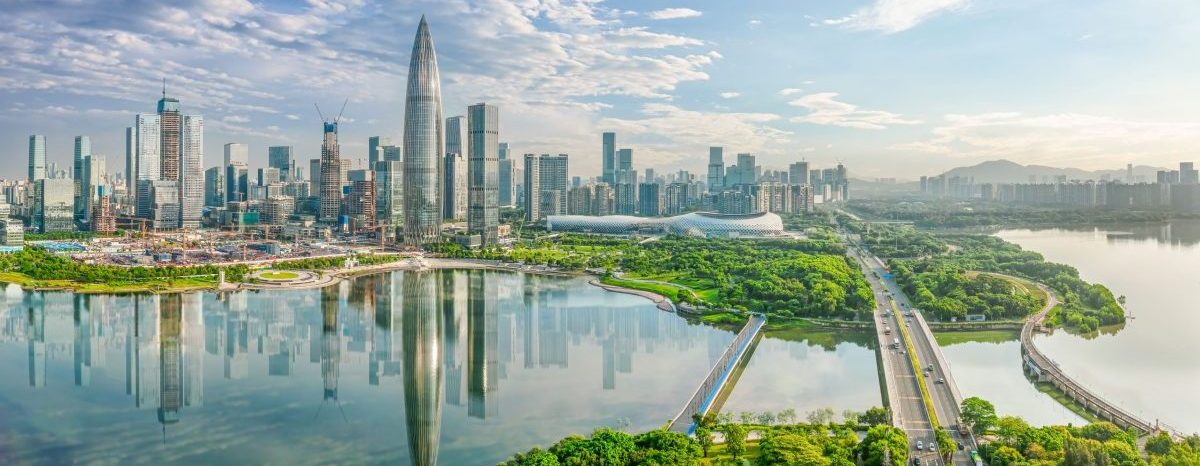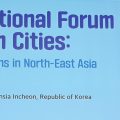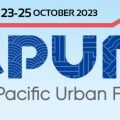ICLEI East Asia promotes City-Business Collaboration on Low-Carbon Development among Asian Cities

On October 29, the 2024 Carbon Peak and Carbon Neutrality Forum and Shenzhen International Low Carbon City Forum were successfully concluded. With the theme of “Developing New Quality Productivity and Promoting the Comprehensive Green Transformation of Development Mode”, the forum invited well-known experts and scholars, research institutions, leading enterprises and representatives of international organizations in the field of green and low-carbon to share the successful practices of green transformation and discuss the way of green and low-carbon development. As a long-term partner of the Forum, ICLEI East Asia Secretariat hosted the Symposium on Climate Neutral Cities and City-Business Collaboration to promote cooperation among Asian cities under the framework of South-South and North-South cooperation. The symposium aims to accelerate local actions to achieve climate neutrality and encourage collaboration between cities and enterprises.

Participants of the Symposium on Climate Neutral Cities and City-Business Collaboration
The Symposium on Climate Neutral Cities and City-Business Collaboration focused on urban carbon neutrality and business collaboration. It brought together representatives from local governments, enterprises, business associations, and international organizations. Participants involved representatives from East Asian cities including Shenzhen, Guangzhou, Ningbo, the Hong Kong Special Administrative Region (SAR), the Macao SAR, Seoul and Kyoto, Southeast Asian cities of Palembang, Penang, Serang Perai, and Alor Gajah, as well as Suryodaya in South Asia. Representatives from ICLEI World Secretariat, East Asia Secretariat, Southeast Asia Secretariat, and Indonesia Office attended the event.
Yunfei Xu, Deputy Director of the Shenzhen Municipal Development and Reform Commission, opened the event with a welcoming speech. Director Xu welcomed representatives from various countries and regions, highlighted Shenzhen’s progress in green and low-carbon development, and showcased the city’s commitment to addressing the challenges of global climate change.

Yunfei Xu, Deputy Director of the Shenzhen Development and Reform Commission
Shu Zhu, Regional Director of ICLEI East Asia and China Representative, emphasized in his speech that ICLEI will continue to promote the exchange of experience and knowledge in low-carbon and green development and encourage local governments and enterprises to work together to explore ways to support local climate and sustainable actions.

Shu Zhu, Regional Director of ICLEI East Asia and China Representative
During the keynote speech session, representatives from different cities shared their practical experiences on the theme of “Innovation Drives Urban Green Transformation”. Chaeyeon Lee from the Transportation Policy Division of the Seoul Metropolitan Government (SMG) pointed out that the transportation sector is one of Seoul’s main sources of carbon emissions, accounting for 17% of the city’s total greenhouse gas emissions. SMG has formulated a policy to reduce transportation costs and piloted the “Climate Card” in January 2024 to promote green travel for the public. This is Korea’s first unlimited monthly transportation card, covering all subway lines, buses, sharing bicycles, and other means of transportation in Seoul, which has been widely used by citizens. Research from the Seoul Research Institute shows that since the launch of the “Climate Card”, cardholders have increased their weekly public transportation usage by 2.34 times. Additionally, approximately 37% of users have reduced their car usage. Statistics indicate that since introducing this policy, Seoul has decreased greenhouse gas emissions by about 10,000 tons, equivalent to planting 3.54 million trees, bringing significant environmental benefits.

Chaeyeon Lee from the Transportation Policy Division of the Seoul Metropolitan Government shares SMG’s Climate Card Initiative
Cho Ching Sin, an architect from the Penang Island City Council in Malaysia, highlighted the efforts of Penang Island in its journey towards green development. In terms of transportation infrastructure, Penang Island has been actively developing a green mobility system, which includes a network of 205 kilometers of bicycle lanes and the construction of a spiral bridge specifically designed for cyclists. These initiatives are expected to reduce carbon emissions by approximately 1,600 tons annually. Regarding urban space renovation, Penang Island has implemented innovative improvements in the back alleys of the World Heritage Area. This includes the installation of energy-saving lighting and rainwater harvesting systems, among other environmental protection measures. These upgrades enhance the safety and comfort of the back alleys and create high-quality public spaces for residents. In the realm of green buildings, 84 structures in Penang have received environmental-friendly certification, contributing to reducing about 105,300 tons of carbon emissions annually.

Cho Ching Sin from the Penang Island City Council in Malaysia shares multi-dimensional achievements in Penang Island’s green development
Togo Uchida, Representative of Kyoto City, pointed out that Kyoto City has set a clear medium-term goal to reduce greenhouse gas emissions to 46% of the 2013 level by 2030 and to achieve an ambitious goal of zero CO2 emissions by 2050. In order to achieve this goal, Kyoto City has stipulated that new and expanded medium- and large-scale buildings must be equipped with renewable energy equipment, and small buildings are encouraged to install photovoltaic power generation facilities. The city has also implemented a greenhouse gas emissions reporting system that mandates large emitters to disclose their energy consumption and submit plans for reducing emissions. The city also actively supports energy-saving renovations for businesses through a subsidy program. Additionally, it carries out waste clothing recycling projects to increase public awareness about recycling and reuse. Furthermore, the city promotes the Decarbonization Pilot Zone initiative, which aims to strengthen community connections to decarbonization goals. This includes efforts such as installing solar panels in parking lots, decarbonizing temples and shopping districts, developing green human resources on university campuses, and building zero-emission communities.

Togo Uchida from Kyoto City, shares Kyoto’s experience in energy transition
Ningjuan Xia from the Nansha District Bureau of the Guangzhou Municipal Bureau of Planning and Natural Resources highlighted Nansha’s proactive response to the call for carbon peaking and carbon neutrality. The approach involves conducting thorough research, fostering multi-agency cooperation, and generating comprehensive research outcomes across the district and community. This process includes preparing special plans and demonstration projects that outline clear development goals, strategies, and pathways. Regarding planning, the focus is on leveraging the ecological framework to create public spaces and implement climate technologies. In engineering construction, the emphasis is on developing green buildings and sponge cities, along with establishing ecological brands. Regarding policies, the area has introduced an ecological chief engineer system, enhanced financial support, implemented climate investment and financing pilots, promoted green living initiatives, and produced manuals, among other related activities.

Ningjuan Xia, Nansha District Bureau of Guangzhou Municipal Bureau of Planning and Natural Resources, shares the experience of green and low-carbon development in Nansha District
Fen Li, Deputy Chief Engineer of Shenzhen Institute of Building Research, introduced Shenzhen’s active exploration in the fields of energy, transportation, construction, and other fields. In terms of energy consumption, Shenzhen’s energy usage per 10,000 yuan of GDP has decreased to one-third of the national average, with clean energy accounting for 78%. In the transportation sector, Shenzhen is actively promoting new energy vehicles, achieving a penetration rate of approximately 68%. Regarding construction, the area dedicated to green building has expanded significantly, and the city has launched China’s first carbon emission monitoring and management system in this field. Additionally, the Future Building, a green transformation pilot building project, incorporates various innovative technologies for energy conservation, emission reduction, and sustainable development.

Fen Li, Deputy Chief Engineer of Shenzhen Institute of Building Research, introduces Shenzhen’s green development achievements
During the event, ICLEI East Asia introduced two key initiatives: the East Asia Carbon Neutral Cities Accelerator and the Green Cities Business Alliance. As one of ICLEI East Asia’s efforts in promoting low-carbon development, the East Asia Carbon Neutral Cities Accelerator aims to systematically research, compile, and promote innovative cases and best practices in low-carbon development among East Asian cities. This initiative will serve as a reference through case compendiums and annual knowledge exchange activities for other cities to advance their green transition progress. The Green City Business Alliance focuses on fostering collaboration between cities and enterprises in developing countries, accelerating the adoption of green and low-carbon technologies. The alliance focuses on renewable energy, pollution control, green infrastructure, circular economy, and other areas and benefits members through forums, research, matchmaking, and capacity-building. Additionally, Alan Ho, President of the Macao Green and Low Carbon Industry Association, released information on the 2025 Macao International Environmental Cooperation Forum and Exhibition.
Focusing on the two key themes of “Urban Energy Smart Transition” and “Green Infrastructure and Circular Economy,” the symposium explored cutting-edge developments and success practices of cities and businesses in policy and technology support and innovation and explored the possibilities of collaboration between cities and businesses.
Focusing on “Urban Energy Smart Transition”, Mohamad Shafie Bin Taib, Director of the Smart Cities and Sustainable Development Department in Alor Gajah City, Malaysia, provided a detailed overview of the city’s efforts in energy transition. He highlighted achievements in solar power generation and outlined plans for upgrading infrastructure. However, he also acknowledged that Alor Gajah faces infrastructure, financing, and public awareness challenges during this transition. He expressed a strong interest in collaborating with enterprises in China to secure support for infrastructure financing, innovative research and development, and community education initiatives.

Mohamad Shafie Bin Taib, Director of the Smart Cities and Sustainability Sector, Alor Gajah City, Malaysia, shares experiences and challenges
Dipesh Acharya, Senior Civil Engineer from Suryodaya, Nepal, shared an analysis of the current energy usage situation, inadequate infrastructure, public consumption habits, and knowledge gaps in Suryodaya. He proposed several collaboration needs, including collaboration with other cities and businesses to introduce new technologies, infrastructure development, capacity building, policy formulation, and carbon monitoring and evaluation. These efforts aim to promote the urban energy transition and support sustainable development.

Dipesh Acharya, Senior Civil Engineer from Suryodaya City, Nepal, joins discussions
Ricardo Jr. Marfiga, Manager of ICLEI Southeast Asia Secretariat, moderated the discussion on “Green Infrastructure and Circular Economy”. Andrei Prima Novriansyah, Director of the Department of Housing, Settlement, and Environment at the Regional Development Planning and Research Bureau in Palembang, Indonesia, provided a comprehensive overview of the city’s planning and practices related to the circular economy. He highlighted efforts to reduce waste, optimize resource utilization, and improve the integration of municipal waste management and sanitation systems. However, he also pointed out the challenges Palembang faces in waste management due to rapid economic growth. These challenges include a lack of sufficient recycling facilities and low resource utilization efficiency. He expressed hope that by collaborating with businesses, the city could achieve its urban circular economy development goals and reach a target of zero solid waste.

Andrei Prima Novriansyah, Director of the Department of Housing, Settlement and Environment, Regional Development Planning and Research Agency, Palembang, Indonesia, presents the city’s plans and cases
Mohd Hafizi Bin Samsuari, Assistant Director-General of the Seberang Perai City Services Authority in Malaysia, mentioned that the Circular Economy Plan launched in 2021 aims to achieve a zero-carbon city. This initiative includes efforts to renovate landfills, develop integrated waste management facilities, and promote public education. It demonstrates Serang Perai City’s active exploration and innovative practices in the field of the circular economy.

Mohd Hafizi Bin Samsuari, Assistant Director-General, City Services Authority, Seberang Perai, Malaysia introduces the city’s innovative approaches and challenges
During the discussion session, representatives from cities and enterprises engaged in a deep discussion about the challenges, technical requirements, and cooperation expectations faced in the promotion process. Additionally, they explored how to seize the opportunities available and work together to identify more potential for collaboration between cities and businesses.
To further promote and explore collaboration between cities and businesses, site visits were arranged for representatives to the Shenzhen Longgang Energy Ecological Park and Sunwoda Electronics Group. At the Longgang Energy Ecological Park, the delegates visited a world-class waste treatment facility that uses super-large domestic waste incineration technology. This facility transforms domestic waste into clean electricity and eco-friendly bricks through processes of recycling, reduction, and harmless disposal. In the Shenzhen Shilongzai Industrial Park, the delegates learned about Sunwoda’s technologies and solutions across six business segments: 3C consumer batteries, intelligent hardware, power batteries, testing services, integrated energy, and intelligent manufacturing. They exchanged views on sustainable development practices with Rui Liang, Vice President and Sustainability Officer of Sunwoda, along with other senior management members of the group.

Participants of the Symposium on Climate Neutral Cities and City-Business Collaboration and the senior management members from Sunwoda Electronics Group
This symposium serves as a valuable platform for fostering exchange and collaboration between cities and businesses across Asian countries. It facilitates sharing experiences and technical knowledge related to urban carbon neutrality and the collaboration between cities and businesses. Additionally, it advances both regional and global efforts toward green transformation, contributing fresh momentum to achieve sustainable development goals. ICLEI is dedicated to deepening and expanding its initiatives, with a strong commitment to continuously uniting efforts from cities and businesses that promote green and low-carbon urban development.

Representatives from ICLEI World Secretariat, East Asia Secretariat, Southeast Asia Secretariat, and Indonesia Office



